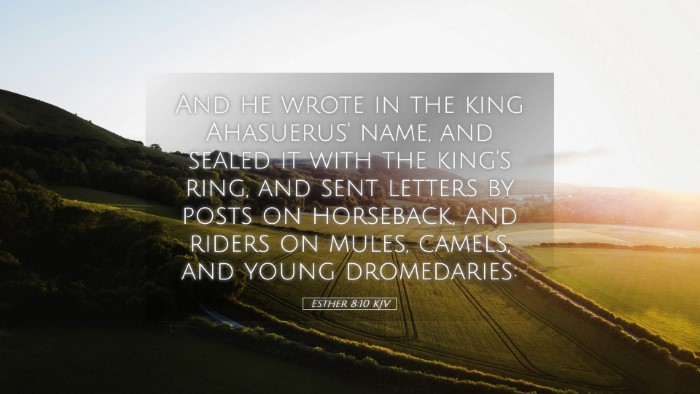Old Testament
Genesis Exodus Leviticus Numbers Deuteronomy Joshua Judges Ruth 1 Samuel 2 Samuel 1 Kings 2 Kings 1 Chronicles 2 Chronicles Ezra Nehemiah Esther Job Psalms Proverbs Ecclesiastes Song of Solomon Isaiah Jeremiah Lamentations Ezekiel Daniel Hosea Joel Amos Obadiah Jonah Micah Nahum Habakkuk Zephaniah Haggai Zechariah MalachiEsther 8:10
Esther 8:10 KJV
And he wrote in the king Ahasuerus' name, and sealed it with the king's ring, and sent letters by posts on horseback, and riders on mules, camels, and young dromedaries:
Esther 8:10 Bible Commentary
Commentary on Esther 8:10
Esther 8:10 states: "And he wrote in the name of King Ahasuerus, and sealed it with the king's ring, and sent letters by posts on horseback, and riders on mules, camels, and young dromedaries." This verse marks a pivotal moment in the story of Esther, wherein the authority and power of the Persian king are utilized to reverse a decree that threatened the Jewish people. Below is a commentary that integrates insights from several public domain sources, exploring the theological, historical, and practical implications of this passage.
Historical Context
The events in the Book of Esther occur during the Persian Empire's rule over the Jewish people after the Babylonian exile. The decree to annihilate the Jews (Esther 3:13) had been sealed by Haman, the king's prime minister. This verse signifies the moment Ahasuerus, influenced by Esther and Mordecai, takes decisive action to counteract this decree.
Analysis of Key Elements
-
The King's Authority:
As noted by Matthew Henry, the king's name and signet ring are emblematic of his supreme power. In the ancient Near East, royal decrees were binding and executed with urgency, demonstrating the weight of Ahasuerus's command. Henry emphasizes that the king’s authority is paramount in the administration of justice and protection.
-
The Act of Writing:
Albert Barnes highlights the significance of the written word in this passage. Writing in the king's name implies an official and irrevocable action that aimed to empower the Jews, allowing them to defend themselves against their enemies. The act of authorizing such letters symbolizes hope and reclamation for the oppressed.
-
The Means of Communication:
Adam Clarke discusses the means of communication in the passage, noting that letters were sent by various means—horseback, mules, camels, and dromedaries—indicating the urgency and importance of the message. This variety underscores the intention to efficiently reach all corners of the kingdom to deliver the good news of the reversal of the death decree.
Theological Implications
This passage raises important theological themes regarding divine providence and justice. The involvement of Esther and Mordecai in this scenario highlights God’s sovereign plan for His people. These events remind believers of God's continuous protection and intervention during times of adversity.
God's Providence
Just as God placed Esther in a position of influence, He orchestrated events to ensure the survival of His people. As noted in the commentaries, such providence serves to reaffirm God’s faithfulness despite human machinations. The intervention of the king is a tangible demonstration that while evil may plan destruction, God has the ultimate authority over life's circumstances.
Courage and Advocacy
The courage shown by Esther serves as a model for advocacy and activism against oppression. Each of the commentators emphasizes the importance of standing for justice and righteousness. Believers are reminded through this passage that they, too, possess the duty and opportunity to advocate for those in need, reflecting Christ's love and justice.
Application for Today
For pastors, theologians, and students alike, Esther 8:10 serves as a powerful reminder of both the challenges and responsibilities embedded in their calling. The following applications can be drawn from the commentary:
-
Encouragement in Adversity:
Just as the Jews found hope in their bleak circumstances, modern believers can take comfort that God is at work even when situations seem dire. Faith amidst uncertainty is crucial.
-
Empowerment through Action:
Drawing parallels from Esther’s boldness, individuals are encouraged to use their platforms for advocacy. This means standing against injustice and supporting the vulnerable.
-
The Importance of Communication:
Esther 8:10 illustrates the role of effective communication in crisis. Pastoral ministry necessitates clear, timely, and compassionate communication to encourage and lead communities.
Conclusion
Esther 8:10 serves not only as a historical account but as a profound theological statement about God’s providential care and the power of righteous advocacy. As believers reflect on this passage, they are called to consider their roles in the ongoing narrative of God’s redemptive work in the world. As articulated by the commentators, the reversal of an evil decree can serve as an encouragement for faith and action today.


